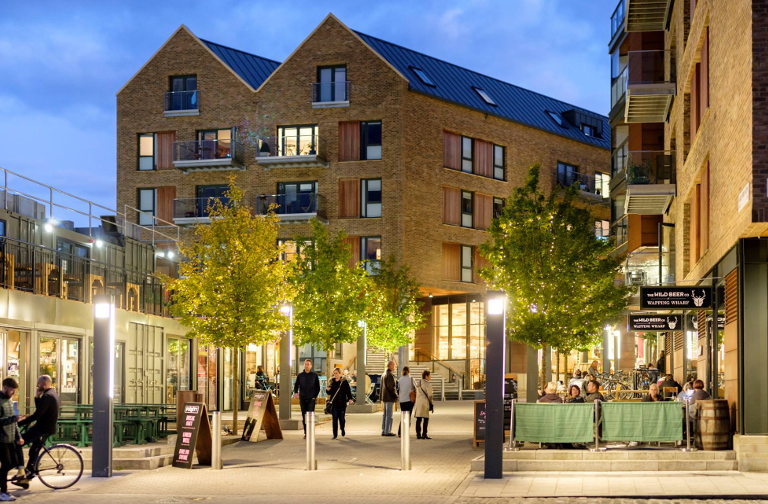In our latest blog post, Stuart Hatton considers the importance of retail diversity. Stuart is managing director of Umberslade, developer of Wapping Wharf, Bristol’s much-loved harbourside neighbourhood and home to many independent food businesses.
This is part of a series of blog posts looking at how we can emerge from the coronavirus pandemic with a more resilient food system, each blog introduced by Bristol Going for Gold Coordinator, Joy Carey.
Joy Carey, Bristol Going for Gold Coordinator and Consultant in Sustainable Food Systems Planning:
Safeguarding retail diversity has had quite a bit of airtime thanks to TV shows by Mary Portas and her ‘Portas Review’ (2011) into the future of Britain’s high streets and town centres in which she outlined her vision. “I don’t want to live in a Britain that doesn’t care about community. And I believe that our high streets are a really important part of building communities and pulling people together in a way that a supermarket or shopping mall, however convenient, however entertaining and however slick, just never can. I want to put the heart back into the centre of our high streets, re-imagined as destinations for socialising, culture, health, wellbeing, creativity and learning. Places that will develop and sustain new and existing markets and businesses.”
Applying Mary’s vision to food retail, we need to see more than just the uniformity of the big supermarket chains in our shopping centres. They are important of course (and some areas of Bristol don’t have easy access to a supermarket at all) but local businesses are the backbone of our economy and need our support, especially in the light of the pandemic. Numerous smaller-scale food producers rely on alternatives to supermarkets in order to get their products to us and thrive as businesses. Diversity brings mutual benefits. A diversity of shopping experiences attracts visitors and a greater diversity of customers. We need that wider range of options for where we can all buy nutritious and culturally relevant food, including independent businesses, market traders, farm shops, home deliveries direct from farmers. Shorter supply chains can provide a more direct connection with the people that produce the food we eat – shoppers can find out more about where the food came from; food producers can get direct feedback from the people that eat their food.

Stapleton Road and Gloucester Road are both great examples of where you can find diverse food retail run by a diversity of business people. Bristol also has a wealth of great independent street food traders and ‘corner shops’ (for example Sonny’s in St Werburghs) that work really hard to provide shoppers with an excellent range of food and drink. Over the last 20 years, various researchers have found that buying from local, independent food shops and traders is better for local employment and can make a significant contribution to the local economy. So let’s all buy something to eat or drink from somewhere local and independent whenever we have the opportunity.
Stuart Hatton, managing director of Umberslade, developer of Wapping Wharf

I knew from very early on – and we’re going back 17 odd years now since we acquired the site that is now home to Wapping Wharf – that the vision for the area, then derelict, must have independents at its heart. We could have pulled in higher rents from the big multiples, but we made a conscious decision not to; we knew that with independents you get drive, passion and uniqueness that you can’t find elsewhere. There are other key advantages to situating independent businesses together in this way, such as combining waste collection. Everything from food waste to cardboard and glass recycling and general refuse is dealt with collectively making it far more efficient and sustainable.
This is a place that’s not only reflects the fierce independent spirit for which Bristol is well known, but also creates a place that offers something really special for the public. It’s safe to say that the eclectic mix of independent shops, restaurants, cafés and other businesses that call Wapping Wharf their home have more than delivered on that expectation. The enormous challenges that the coronavirus pandemic have brought for the retail and hospitality sectors have only clearly highlighted their ability to innovate and adapt in response to evolving consumer habits, not to mention, major regulatory changes. From launching new websites and online services to partnering up with local delivery companies, from starting up click and collect services to creating new subscription services, and of course numerous measures to keep staff and customers safe, businesses at Wapping Wharf, and across Bristol, have certainly put in the hard graft.
Some examples of this around the city include the #WeAreBS3 website which mobilised quickly during the lockdown, and out of the lockdown came a number of maps available online to navigate some of Bristol’s brilliant independent retailers – such as the Bristol Independent Deliveries’ interactive map, which includes businesses that deliver food. Other great websites include The Lockdown Economy, Bristol Food Union’s resources and the Bristol Pantry also connects Bristol food lovers direct to producers. Bristol has one of the most exciting food scenes in the UK and by supporting local businesses in these difficult, uncertain times we can ensure that they continue to thrive in the future.
So even during this second national lockdown, there are plenty of easy ways to shop local without needing to physically go into a store – and you can benefit from these when restrictions ease in the future too. Clifton Seafood Company at Wapping Wharf offers local delivery so fresh fish and seafood can be delivered straight to your door. You can even order a subscription from Meat Box situated next door to get pasture-fed organic meat delivered to you regularly. There are so many alternatives to using supermarkets – now even more so than ever, not just at Wapping Wharf, but across Bristol; for example, box schemes like The Community Farm or Sims Hill, and farmers’ markets are an excellent source of fresh, local produce.
We’re super excited and very proud to be launching this **brand new film** celebrating our incredible independents here at #WappingWharf – check them out here and see how they sparkle ???️? @boxebristol @bristol_cheese @indiesinbristol @VisitBristol @UmbersladeGroup pic.twitter.com/HTqbxRqOkJ
— Wapping Wharf (@WappingWharfBS1) November 23, 2020
As the Bristol Going for Gold campaign highlights, Bristol has come a long way in changing the way it grows, buys and produces food – but there is still plenty more we can do. So, why should we change our ways? Buying local has many benefits, keeping money in the local economy which supports our communities, and there are fewer miles and lower carbon emissions in transporting food from field to plate. As the pandemic has showed us, there is also an inherent risk in relying only on supermarkets. We need a wider range of options for where we can all buy nutritious food. Also, smaller scale food producers need alternatives to supermarkets in order to get their products to us and thrive as businesses. Retail diversity brings mutual benefits.
The community spirit that exists among independents is also second to none; certainly from what I’ve experienced at Wapping Wharf and more widely in Bristol, they can make positive change happen in a way that really makes a difference – and fast! I have been so impressed by the work done by Bristol Food Union, which has seen restaurants, food businesses and community organisations come together to support the city council’s emergency food provision during the COVID-19 crisis. They created secure production kitchens in closed restaurants around the city; they supported Caring in Bristol to feed 500 homeless people each day; provided meals for the vulnerable in the Chew Valley area; delivered weekly food provisions to vulnerable adults who have recently left the foster-care system… the list goes on! And with a second national lockdown underway, they have swung into action once again…
This just goes to show what smaller scale businesses are made of and that supporting them also has a direct positive impact on the wider communities within which we live. At Wapping Wharf, it’s always been very important to me to ensure the mix of businesses we have there complement one another. I’m proud that we continue to achieve that diversity as I believe this makes for a thriving eco-system where everyone has a chance to succeed. The independent retail scene in Bristol reflects this in many ways, meaning there are so many different routes we can take to shop local – let’s follow the excellent example of our independents and use this opportunity to make positive change happen.
Visit the Bristol Bites Back Better website to find out how you and your organisation can play a role in building a stronger food system for Bristol. Share your insights and stories using the hashtag #BiteBackBetter.
The need for a resilient food community has never been greater. The coronavirus pandemic has already led to unforeseen challenges for our city’s food system, and unimagined resourcefulness from communities and organisations across Bristol.
Teaser photo credit: Wapping Wharf Facebook page





